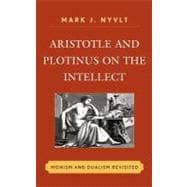
What is included with this book?
| Foreword | p. ix |
| Acknowledgments | p. xiii |
| Introduction | p. 1 |
| Aristotle on the Platonic Two-Principles Doctrine: The One and the Indefinite Dyad | p. 11 |
| Aristotle and Speusippus | p. 39 |
| Aristotelian Henology | p. 57 |
| The Anatomy of Aristotle's Metaphysics | p. 73 |
| The Unmoved Mover and the Simplicity and Priority of $$$: Metaphysics ¿ 7, De Anima III.4-5, and Metaphysics ¿ 9 | p. 97 |
| The 'E¿i¿¿¿oon' of the One and the Derivation of $$$ | p. 131 |
| Plotinus on Phantasia: Phantasia as the Home of Self-Consciousness within the Soul | p. 165 |
| Alcinous and Alexander on the Intelligibles within $$$ | p. 187 |
| Plotinus on the Simplicity of $$$: An Appropriation and Critique of Aristotle's Noetic Doctrine | p. 215 |
| Conclusion | p. 233 |
| Bibliography | p. 241 |
| Index | p. 259 |
| About the Author | p. 263 |
| Table of Contents provided by Ingram. All Rights Reserved. |
The New copy of this book will include any supplemental materials advertised. Please check the title of the book to determine if it should include any access cards, study guides, lab manuals, CDs, etc.
The Used, Rental and eBook copies of this book are not guaranteed to include any supplemental materials. Typically, only the book itself is included. This is true even if the title states it includes any access cards, study guides, lab manuals, CDs, etc.